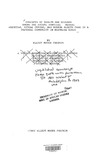| dc.description.abstract | The Ariaal Rendille are a nomadic pastoralist population who
torm a cultural bridge between the Samburu cattle-herders and Rendille
camel-herders of northern Kenya, East Africa. The Ariaal. utilize the
intermediate ecologic zone along the highland-lowland interface of the
Ndoto Mountains, enabling them to practice a dual cattle-camel economy
where the population subsists off the camel and small stock herds and use
their cattle for traditional and modern cash exchange.
Despite a nutritious diet of milk, meat and blood and an environment
relatively free of water-borne diseases, the Ariaal face
periodic undernourishment and exposure to a variety of infectious
diseases including malaria, pnuemonia, whooping cough, and measles.
Mortality is particularly high in children. In addition, the society
faces famIliar but debilitating health problems related to childbirth,
accidents, old age, and mental illness.
The Ariaal are not helpless in the face of these health
problems, but possess a traditional medical system that categorizes,
diagnoses, and treats many of the illnesses they experience. An out-
- standing teature of their ethnomedicine is the rich inventory of herbal
medicines prepared as ointments, fumigants, purgatives and emetics.
Herbal specialists are widespread 'and often competent in midwifery,
massage technIques, and bone setting. Their skills encompass an extensive
emfJirical knowledge of health problems experienced by the Ariaal.
3
A distinct but equally important aspect or Arlaal tradItional
medicine is the belief in sorcery, where human enemies can manipulate
supernatural forces to inflict harm and illness. Problems in sexual reproduction
and mental illness in particular are thought due to sorcery.
To this end, the Ariaal believe only a ritual specialist, the Samburu
~o~bonokr can treat, cure, and prevent sorcery acts. Both the ritual
curing of the loibonok and the mechanic-chemical treatments ot the
herbal specialists coexist as methods of health care, where either or
both specialists will be consulted when illness occurs.
The advent of western medical treatment represents a new
component of Ariaal response to illness. Modern Health care has been
among the most important changes in Ariaal society and represents a
fundamental development in their integration into the wider Kenya society
and economy. Of significance both demographically and socially is the
health care delivery of preventative medicines, particularly vaccinations,
to the rural nomadic populations in Kenya. This dissertation, a
medical anthropological description, analyses the concepts and practices
ot Ariaal traditional medicine and its integration with modern health
care delivery in northern Kenya. | en |

